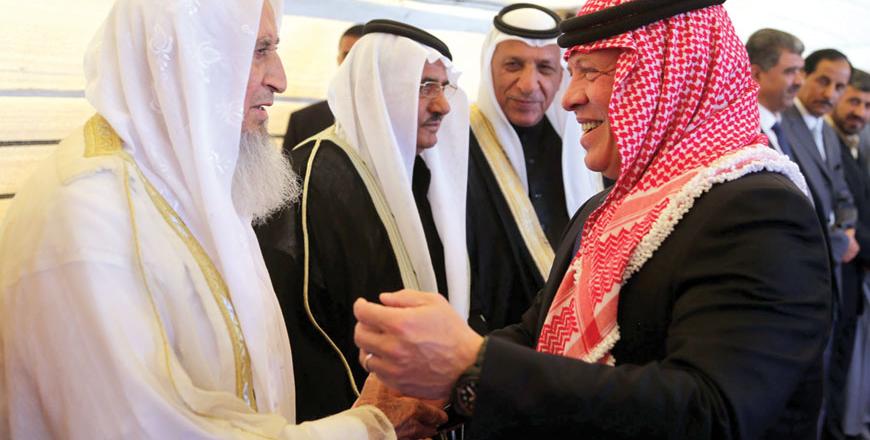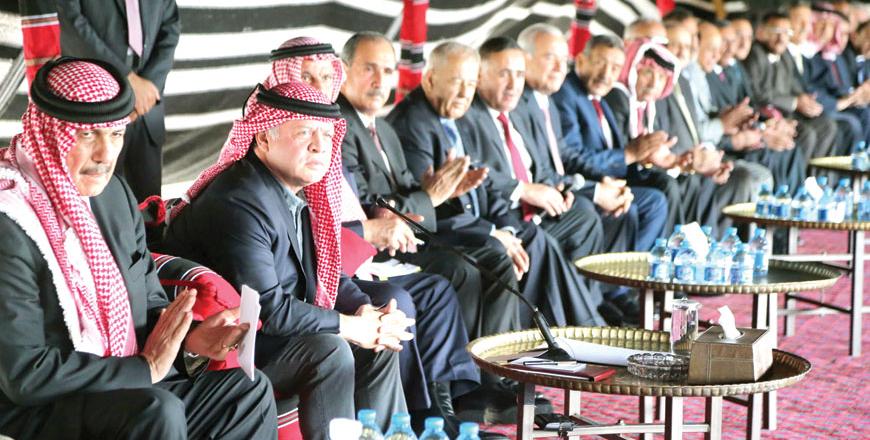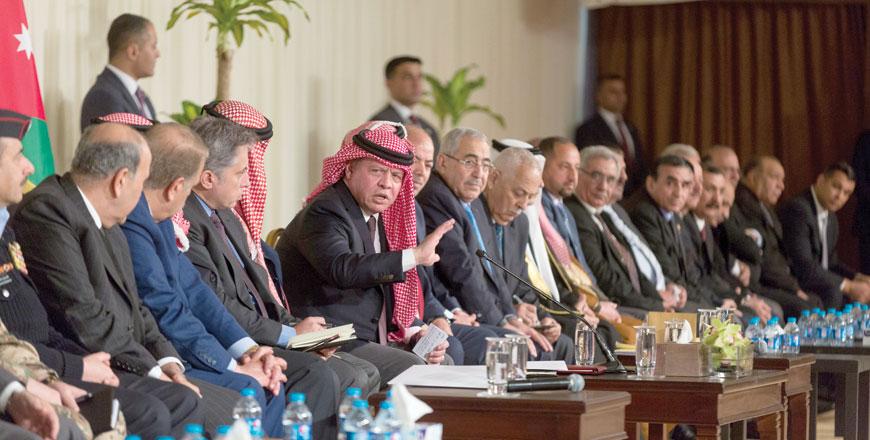You are here
King: I draw my strength from my people
By JT - Jan 07,2016 - Last updated at Jan 07,2016

His Majesty King Abdullah speaks to dignitaries and representatives of Zarqa Governorate at the Royal Court in Amman on Wednesday (Photo courtesy of Royal Court)
AMMAN — His Majesty King Abdullah on Wednesday expressed pride in meeting with the people of Zarqa Governorate, recalling his memories of his earlier days when he joined the army and expressing his understanding of the governorate's problems.
At a meeting with dignitaries and representatives of Zarqa Governorate at the Royal Court, the King said it was in Zarqa "where I had many memories since my early days with the Jordan Armed Forces-Arab Army and where I have made friendships with many of Zarqa's people during my military service."
"I am aware of the challenges facing the governorate, especially regarding the environment, services and the population density problem," the King told the governorate representatives, according to a statement by the Royal Court.
At the meeting, which came in line with the King’s commitment to keep in contact with all Jordanians throughout the Kingdom, the King re-asserted that “combating poverty and unemployment is a priority for us”.
“For years, I have been highlighting the importance of focusing on the economy,” he said.
As for the country’s security and stability, the King assured Jordanians that they remain intact.
This year, the Jordanian people will celebrate the centennial of the Great Arab Revolt and the 70th anniversary of the Kingdom’s independence, he noted, pointing out that “there is a lot of work ahead to achieve the aspired progress”.
The King expressed his confidence in the Jordan Armed Forces and security bodies, noting that they are capable of protecting Jordan, emphasising that his main concern is to improve the Jordanian people’s standards of living.
“I am not worried about the political, security and military situation. The Jordan Armed Forces-Arab Army and the security bodies are capable of protecting Jordan,” he said.
“Our duty today is to improve Jordanians’ standards of living, as a main goal for all of us.”
He noted that a main challenge facing Jordan is that it imports a large part of its energy needs from abroad, in addition to fact that it is now hosting a large number of Syrian refugees, “which have affected the state budget”.
The King voiced appreciation for countries assisting Jordan to shoulder the burdens of the current refugee crisis, noting that over the past year some 25 per cent of the state budget was used to deal with the Syrian refugee crisis, “not only for camps, but also for services in the health, education and energy sectors”.
Expressing his pride in the Jordanian people, he said countries from around the world help Jordan due to their respect of the Jordanian people and their historic role in enduring the regional problems. The King thanked the Jordanian people for their patience and endurance.
“Wherever we go, we find love and appreciation from the world for the Jordanian people and for Jordan’s historic role in handling regional problems”.
Despite regional and global pressures, “I draw my strength from my people”, the King said.
King Abdullah highlighted this year’s opportunities for improving economic conditions, noting that an important conference will be held in Britain at the beginning of next month with the participation of a large number of Western countries. The gathering, His Majesty said, will focus on ways to deal with the issue of Syrian refugees, worldwide, in general, and in Jordan, in particular.
These countries will discuss ways to assist the government of Jordan and the budget, to alleviate domestic and external debt, in a manner that helps complete the implementation of development projects across the Kingdom from the north to the south.
“The most important part for us is how to combat poverty and unemployment,” the King said, adding that this would be achieved through increasing investments across the Kingdom and providing job opportunities for Jordanians and a fraction of Syrian refugees.
“Several opportunities have been wasted in the past due to regional problems but we hope that during this year, we will not waste the golden opportunity that Jordan has at the conference, as there is a chance to rectify conditions and to draw more support and assistance,” King Abdullah told the gathering.
“We have exerted a lot of efforts over the past six months, as part of coordination with different countries to assist us,” he added, noting that the government, ministers and officials should cooperate and coordinate because drawing assistance is an urgent matter.
There is no place for personal agendas at work, he said, pointing out that Jordan’s success in drawing assistance will reflect positively on the country in the coming years.
Pointing out that citizens are the only ones who suffer at the end of the day due to hindrances and delays, the King stressed the importance of collective efforts, reiterating that this year holds a great deal of opportunities, and “it is up to us to prove our ability and flexibility, in the government and at the Parliament, to benefit from them”.
The King said the opportunities ahead are enough to make us work so that the New Year, the Centennial of the Great Arab Revolt, will be a landmark on the road of progress and achievement.
Speaking at the meeting, Royal Court Chief Fayez Tarawneh said His Majesty has directed the concerned authorities at the Royal Court to see to the implementation of a number of Royal initiatives to improve services in Zarqa, some 22km east of Amman.
The initiatives include building 45 housing units for underprivileged families in coordination with the Social Development Ministry and constructing a new building for the King Abdullah II School for Excellence in the governorate.
Moreover, a factory to manufacture containers will be established to provide 20 job opportunities for residents and to provide the municipality with garbage dumpsters, Tarawneh said.
The King also issued directives to support cooperatives and charity societies, Tarawneh noted, to enable them to implement small income-generating projects to support underprivileged families.
Tarawneh added that the Royal initiatives also include revamping five public parks in the governorate and constructing or rehabilitating four mini pitches in several areas.
Those present at the meeting voiced their pride in getting the opportunity to meet the King, stressing the strong ties that unite Jordanians with their leadership.
They called for improving healthcare, educational and municipal services in the governorate.
The Zarqa representatives also commended the King’s initiatives in education and his efforts to defend Islamic and Christian sites in Jerusalem and urge the world to resolve the Palestinian issue.
Moreover, they lauded the His Majesty’s work to defend Islam and counter attempts by the “khawarej” (the outlaws of Islam) to distort its image.
Sheikh Deifallah Qallab said every Jordanian is proud of the Jordan Armed Forces-Arab Army and security services for their efforts to defend the country, calling for more support to servicemen.
Khaled Zyoud, president of the General Trade Union of Workers in Petrochemicals, called for establishing investment projects in Zarqa to alleviate poverty and unemployment.
Former MP Salameh Ghweiri, who vowed support for the country’s anti-extremism drive and support for Jerusalem, called for supporting infrastructure projects in Zarqa.
For his part, former senator Mustafa Fayyad noted that some parties attempt to tarnish Jordan’s efforts to support Palestine and the holy places, stressing that Jordanians of all origins and backgrounds back their leadership as it endeavours to help the Palestinians achieve self-determination through establishing their independent state.
Zarqa Mayor Imad Momani emphasised that all government agencies in Zarqa are keen on the best municipal services, noting the need to implement some vital projects such as a household products exhibition, a “culture street” to encourage cultural activities and the rapid transit bus.
A women’s activist, Nuwara Zyoud, praised women empowerment efforts in the governorate, while former MP Mohammad Arsalan called for conducting a study that highlights promising economic sectors that are likely to generate jobs and the establishment of an industrial zone to streamline the “distorted” industrial environment in the district.
Representing Azraq area in the east desert, Shakeeb Shomary urged support for entrepreneurs through the Governorates Fund.
Other community leaders and public figures took turns to speak, with all voicing support for the Hashemite leadership and underlining the needs of Zarqa.
Related Articles
AMMAN — His Majesty King Abdullah on Sunday said that the issue of festive firing will be seriously dealt with and measures will be taken to
AMMAN — His Majesty King Abdullah on Sunday said officials should work to improve conditions in Maan as soon as possible, highlighting proje
AMMAN — His Majesty King Abdullah on Wednesday asserted that the Kingdom's northern border with Syria is strong and safe, voicing his confid


















